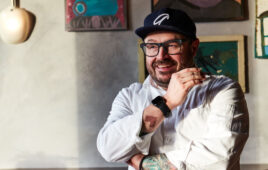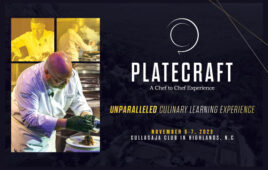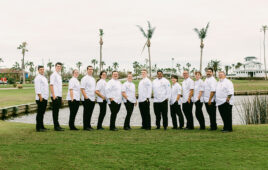 From the poster in his office to everything that’s put on plates at the property, Edward Leonard, CMC, has left no doubt from the moment he arrived how he plans to achieve continued success at The Polo Club of Boca Raton.
From the poster in his office to everything that’s put on plates at the property, Edward Leonard, CMC, has left no doubt from the moment he arrived how he plans to achieve continued success at The Polo Club of Boca Raton.
When I heard that the cover story of the November issue of C&RB would feature The Polo Club of Boca Raton, I thought it would be timely to do a new “Chef to Chef” interview with Edward Leonard, CMC, who is The Polo Club’s new Director of Culinary Operations.
Chef Leonard has been one of the most high-profile industry leaders for more than three decades, and I first interviewed him for “Chef to Chef” when he was Executive Chef of the prestigious Westchester Country Club in Rye, N.Y. (“Writing the Book on Private Club Cuisine,” C&RB, September 2006).
Since that time, Chef Leonard has only continued to add more sparkling credentials to his resume. From serving as manager and coach of the USA’s gold medal-winning culinary Olympic teams, to making visits as a James Beard Foundation Guest Chef, to the six books that have profiled his career journey, Leonard is someone we have consistently looked to for direction and guidance as we face the trends that shape what we do as chefs.
| CHEF PROFILE Edward Leonard, CMCCurrent Position: Director of Culinary Operations, The Polo Club of Boca Raton (Fla.) (September 2015-Present)Previous Experience: • Director of Culinary Operations, Reynolds Plantation, Greensboro, Ga. (January 2015-September 2015) • Vice President, Culinary Education North America, Le Cordon Bleu Culinary Schools (2010-2014) • Director of Culinary Operations, Executive Chef and Assistant General Manager, Westchester Country Club, Rye, N.Y. (2002-2010) • National President/COO, American Culinary Federation (2000-2004) • VP Culinary Operations, Food 1st Restaurant Corp. (1997-2001) • Corporate Chef USA/Director F&B/Vice President Operations, TrustHouse Forte (1984-1997) Education: Certifications and Awards: |
In his new role at The Polo Club, Leonard has quickly begun to use his vast industry ties and apprenticeship recruiting skills to build another powerhouse team. We were pleased to have the opportunity to catch up with Chef Leonard again and listen to his thoughts on the current state of our industry and what he sees coming down the road—and most of all, to once again hear how he retains his incredible passion for his craft, the club industry, and for mentoring those who have had the good fortune to work in his kitchens.
C&RB: Chef, it’s been five years since you last held a club chef position. How has the club industry changed in just that short period of time?
Leonard: Actually, that sounds like a long time—LOL. The profession and industry as a whole has changed, and clubs are no exception. I believe a few things are going on that create new challenges, but are also exciting for the long term. Golf is no longer the only driving force at most clubs; food and beverage, other recreational activities and the social aspect of membership have become equally important, and in some places they are surpassing golf.
The ability to provide fun events and family-oriented dining experiences is now paramount for a club’s future growth and success in retaining members. The largest challenge is age and financial demographics. Not every member at a club is wealthy, and this can especially be the case at residence-driven private clubs or resorts. Many are on fixed incomes and some purchased their properties many years ago. While the real estate may be worth more, their financial situation may be very different than the new member who just bought a $2 million house.
Creating a program that pleases the various age demographics can be a challenge in writing menus and for the food that you serve. The overall direction that I believe you need to take is to please the vast majority and also to go where the growth will be for the future stability of the club and its F&B program. Food is very subjective, and even in the club business you can’t be everything to everyone.
C&RB: As you set out to lead the culinary team at The Polo Club for the purpose of building a culture of success, what types of motivational techniques did you use?
Leonard: Good question, Jerry; words like motivation and inspiration are key for today. In the past, many chefs have seen their role as “Do what I say and we’ll move forward.” But times change and people change, and chefs now need to inspire and motivate, not just demand. Years ago, the response you expected to get was simply, “Yes, Chef.” But today’s culinarians are more likely to say, “Yes, Chef—but why?”
Building a culture of culinary excellence starts with vision and a plan, and then setting the expectations for your team and showing them what they can expect from you and your chefs. It is a two-way street; yes, we expect you to perform, we expect reliability, and so forth. But your team also has a right to expect things from you, such as firm but fair leadership, good communication, and setting the example for all to follow.
A great chef never expects from his or her brigade what he or she does not do as well. If you expect passion and professionalism, then show that yourself, every day.

This poster, displayed in Chef Leonard’s office, leaves little doubt as to why he’s there and how he plans to achieve continued success.
I am not sure that I have motivational “techniques”; what I try to have is leadership that is sincere and honest, and a drive to be the very best. More importantly, I want to make those who work with me the best they can be, while sharing a sincere passion for all things culinary.
C&RB: You’ve always had incredibly strong internship programs at your properties, and have already built a waiting list for culinary positions at The Polo Club. What advice can you offer club chefs who want to strengthen their programs?
Leonard: Recruiting those with strong energy and passion and who want to learn has always been a key to the success of any strong kitchen. Regardless of how good you and your other top chefs may be, your core team is the workhorse of every kitchen.
The reputation of the property and the chef, in ensuring that those who pass through your kitchen will end up in a great place because of the training they receive, play a key in recruiting. An educational kitchen is a must.
C&RB: You keep current on all technology as it relates to our field. What are some of the products you’ve seen that are game-changers for club chefs?
Leonard: The demands of members and customers everywhere have changed. People want great food today, but they want it faster.
The industry has developed some awesome tools to help us with this. There is a panini grill that cooks sandwiches in under 55 seconds! Your bread is toasted, the meat is hot, the cheese is melted, and your lettuce and tomato is intact. There is a pizza oven that produces pies in less than two minutes, with dough that is crusty and charred!
The key to this, however, is the quality of your product. What goes in is what comes out. Quality artisan bread and ingredients make that panini not only come out of the kitchen fast, but full of flavor. If you make or use a fresh dough versus a bought shell, you’ll have two different outcomes.
So, while technology is providing chefs with new ways to handle volume and be efficient and consistent, chefs still need to understand and embrace how to use these tools properly, while keeping quality at the forefront.
C&RB: Chef, you’re one of a select few chefs that would have great insight into food trends for our industry. What do you see impacting club chefs moving forward?
Leonard: I think there will be many factors that impact all that we as club chefs do.
One of the biggest challenges is recruiting a passionate and talented labor pool that wants to be in a club setting. Because clubs are private, they do not receive as much press or marketing attention. So when the top culinarians seek “the job” after coming out of school, they of course try to follow the top chefs who are being written about at a Ritz-Carlton or Four Seasons venue.
This is a shame, as there are so many talented chefs in clubs, which can be stellar venues and have great kitchens to work in. But the culinary schools do very little to promote this. We as a group need to make more noise to showcase the benefits of working at a 4- or 5-star club and promote how we can mentor young talent to help them grow in their careers.
Another challenge is meeting the growing demands and expectations of members for food because of what they’ve seen and learned from the commercial sectors—cooking shows, travel, marketing and chain restaurants that have stepped up their games, at least on perception. Expectations about the size and variety of menus and for food quality and speed of service are higher than ever. Throw in the fact that it’s “their club,” and demands are compounded even more.
All of the marketing attention now given to “farm to table,” “natural raised,” “organic,” etc., also creates new demands that come at a cost. A regular purchased chicken is about $1.40 cheaper per pound than a natural or free-range bird, in venues that are already at a lower price point than the commercial venues our members go to.
A lot of misleading dietary information is also being spread around that will keep challenging many club chefs, especially if they have an older demographic. The marketing power of food companies for staples such as sugar and corn is crazy, and the influence they can have on people who jump on the bandwagon with little factual information is great.
Take gluten, for example. Real, non-biased studies have been done to show that gluten-free products cost more and they do not help you lose weight. The substitute for gluten is rice products and rice flour; these products contain a high level of arsenic way above limits allowed in a diet.
Those who do not have a real health issue with gluten, or a real allergy, should stay away from these products and eat real artisan-made bread and whole-wheat products.
The good news is, the demand and love for global flavors gives chefs a new avenue for showcasing their skills and the skills of their teams, especially for Asian, Italian or other culinary expertise. This means we need to do better food, even if it’s just a simple, open-face turkey sandwich. The renewed emphasis on quality offers many new opportunities to find and demonstrate ways to please and excite the palate.
C&RB: Finally, Chef, with all you have accomplished in your career, what makes you the most proud?
Leonard: Jerry, I have been blessed to do some stellar things, and to travel and simply share what drives and motivates me every single day I get out of bed.
I have been recognized and given so many awards, trophies, and medals it is humbling to me. There is responsibility that comes with this, and I have never taken it lightly.
That responsibility is for me to give back, and to ensure that others can get to a place where they are as happy. It makes me proud whenever I can know that in some small way I contributed to help others learn, put fire in their passion, and taught respect for our craft.
So what makes me most proud is seeing where everyone is today who has passed through my kitchens. Receiving texts, e-mails and Facebook posts that say “Chef, thank you for what you have done for me; thank you for sharing your cuisine and your photos”—that is what fuels my fire and makes me continue to try to be better.
I never realized how much impact, even from afar, a chef can have. On Facebook I hear from chefs from other countries who read my books, watch my posts and then challenge themselves to do new things. I never realized the impact that the club cuisine book had until so many chefs told me.
Jon Moosmiller, CMC; Brian Beland, CMC; Mike Matarazzo, Michael J. Pillarella; Nick Laundry; Charlie Figaro—these are just some of the talented culinarians who have passed through my kitchens and are now chefs at their own clubs, doing super things. Hopefully they are passing the torch of education and passion for our craft on to others as well. That is the true meaning of success in life, and what I am most proud of.
Recipes:
Chef’s Roasted Chicken
Eggplant Cannellini
Trio of Lamb




